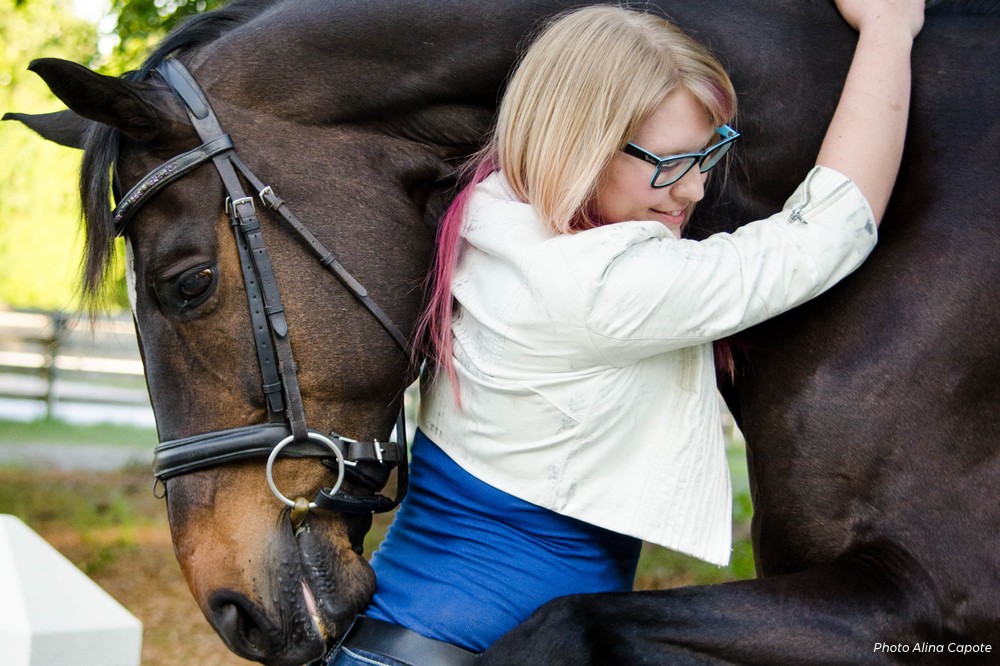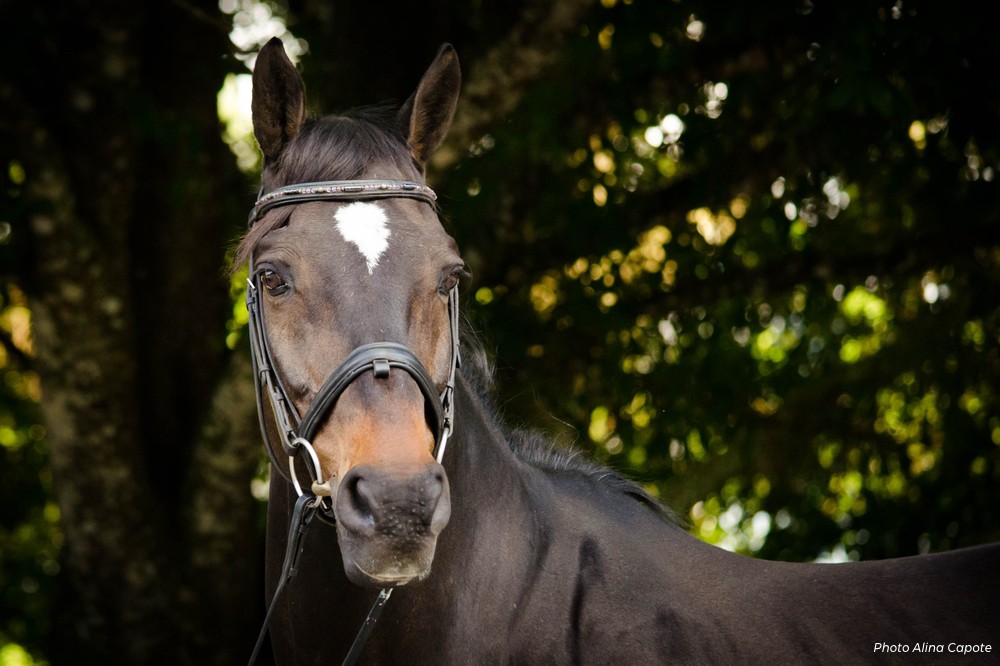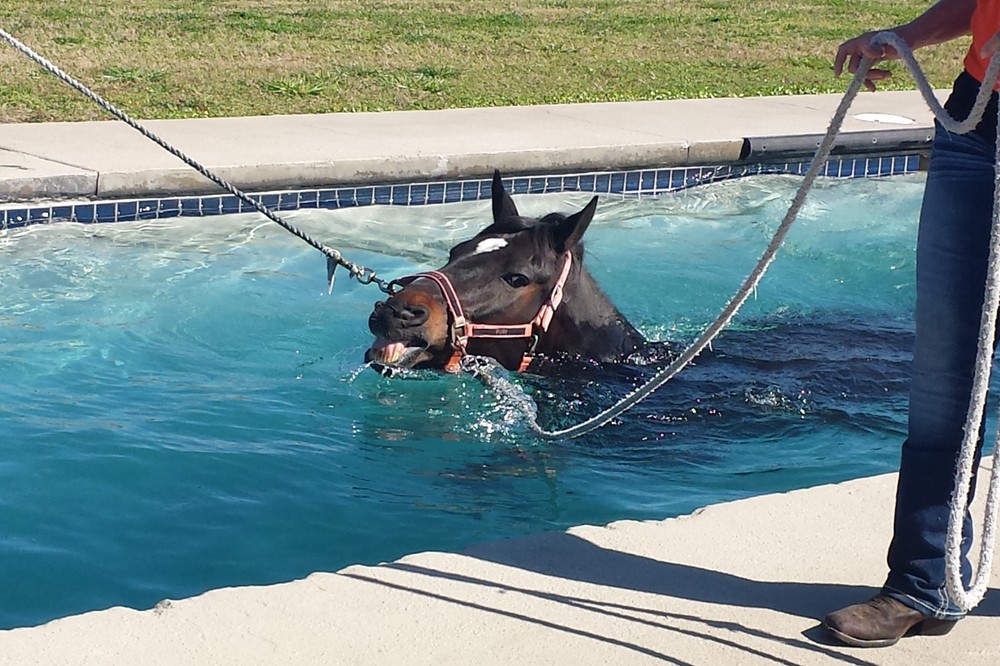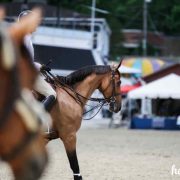True Life: I Lost My Grand Prix Horse to Narcolepsy

By Rebecca Agocs
Michelle Sheridan is, like the rest of us, the ever-devoted horse girl at heart. Years of hard work, lessons, and horse shows have brought her to where she is today: training up her next Grand Prix prospect, Sully.
Before Sully, Michelle had an outstanding Grand Prix I caught up with Michelle after learning that her Young Riders mount, Grand Prix horse, and long-time partner, Rouxletto, had been retired due to a mysterious sickness that had been lurking in the shadows for years: narcolepsy.
The First Few Years
When I was twelve, we bought Rouxletto as a five year old imported from Germany. I had just sat down with my parents and told them that I wanted to compete as an FEI Junior/Young Rider when my trainer called saying she’d found “The One”.
After getting to know each other, I entered Training level at a show and finished the class with a 75%, which won us the high point Junior award. The next year, he began testing a lot of boundaries under saddle and I was frustrated. One judge even commented on one of my score sheets for a second level test: “Airs above ground not required at this level.” My senior year of high school, Roux started displaying a mystery soreness in his hocks and anhidrosis, which is the inability to sweat and regulate body temperature, so I decided to give him the year off.

Young Rider and Grand Prix Goals
I began attending University of Central Florida. I had done research and realized Anne Gribbons, an idol of mine, had her business outside the city. When Roux got to the farm, they were surprised; he hadn’t been ridden for a year, and I came to them saying I wanted to do Young Riders (NAJYRC)!
My first show back with him was Third level and he won every class. I moved into Fourth level and we were Region 3 Champions. When I rode Prix St. George, we were Reserve Champions. The next spring, I submitted my declaration that I would be competing for a spot on the 2012 Region 3 NAJYRC team. We made the team and were able to compete in Kentucky. Region 3 placed 6th that year.
I had been schooling Intermediare-1, so I set my sights on the USDF Regional Championships at the end of the year. We qualified for and ended up winning the Championship title there. My next goal was for him to be my Under-25 Grand Prix horse.
Discovery
For a while, I didn’t realize my horse had narcolepsy. The first episode I saw was at a horse show. I was braiding his mane and he went from eating, to the ground. Roux shook his head, stood back up, and went back to eating. He didn’t seem harmed, so I brushed it off. From then, I began to observe him more closely and noticed he would fall asleep suddenly and drop down to his knees from time to time. Sometimes unexplained scrapes would appear on his face.
He seemed to do it more often when there was some “positive” stimulus involved. For example, if a working student went into his stall, he would get excited and then drop to the ground. I talked to some vets and we decided it must be extreme exhaustion. My boyfriend wired a 24-hour recording camera into his stall so we could see whether or not Roux was laying down to go into REM sleep. Exhaustion is caused when a horse won’t lay down to go into deep sleep. After poring over the footage, I ended up finding evidence of him laying down to sleep AND of him falling over.
The Outcome
I cut pool noodles and put them on his halter to pad his face. I wrapped his legs up in every ounce of protection I could.
As I was gathering evidence of what was going on, he toppled over in his stall and got cast badly. His hind leg got caught and he pulled on the suspensory ligament. He was battling multiple splints on both front legs which would pop when he would fall over. That’s when his career ended.
They were able to perform extensive tests and diagnosed him with narcolepsy. It is not often seen in warmbloods, but Roux is branded Oldenburg, bred Hanoverian x Holsteiner, and back in his bloodlines he has other breeds. So, it’s speculated he may have just lost the recessive gene potluck.
The vets thought maybe it was best to humanely euthanize him, but they were willing to prescribe medications they had seen work in the past on other narcoleptic horses. I was warned that I might not be able to ride him again, even if we could manage the episodes and bring back his quality of life.
Once he was stabilized, his suspensory ligament and splints became the next problem. We took him to a rehabilitation facility for swimming therapy. He swam in the pool nearly every day for 30 days, had some shockwave therapy sessions on the suspensory ligament, and came home approved to hack out under saddle.

Now, he can be happily ridden at all gaits. He occasionally has a narcoleptic “attack”, but they are few and far between. It’s like any medication – he isn’t 100% cured, but 98% of the time he’s fine. Nowadays, careful management and medicine allow him to function as a normal horse.
Update
Since Roux’s return to pseudo-retired riding functionality, he’s continued to show me that he is the heart horse that just keeps on giving! Through careful use of adjunct therapies such as acupuncture and compression therapy, he’s regained a fair amount of pelvic rotation, flexibility, and his splints have gone down instead of increasing in size. He was also diagnosed with Cushing’s disease, which prompted some very curious phone calls between his vet and the leading pharmaceutical vets in the nation, but at almost 20 years old, he’s moving back up the levels at his own pace. He doesn’t owe me anything but who knows; maybe he could still make his grand prix debut in the future!


